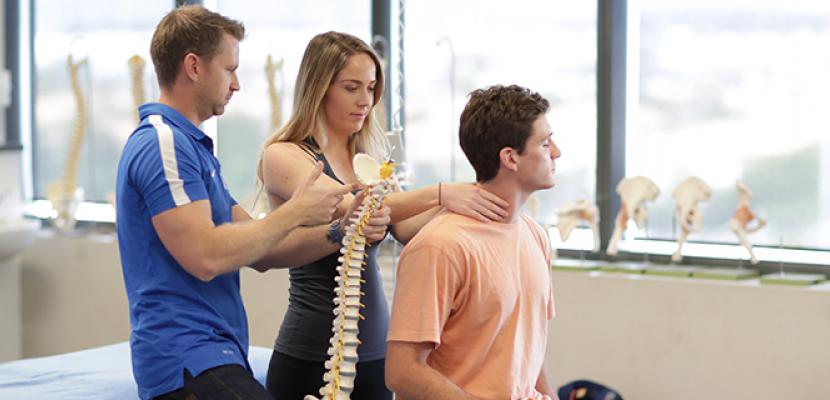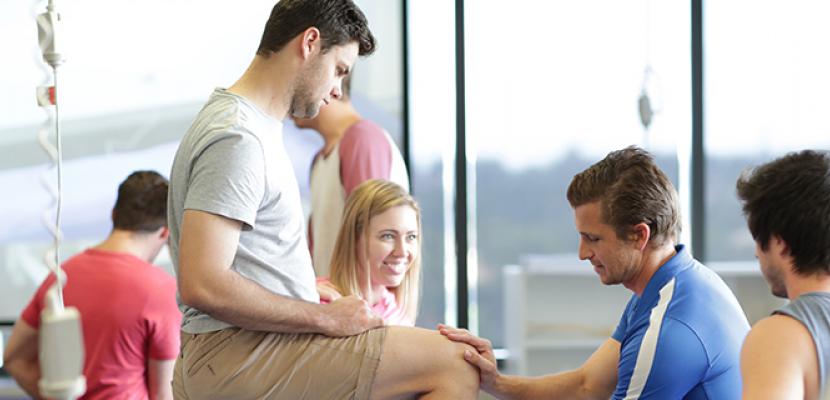
Physiotherapy is a rewarding career. Every day, you are helping people recover from injuries, improve their athletic performance and enhance their lives.
With our newest Doctor of Physiotherapy (CRICOS 111801K) students starting in May, we asked Bondies Catherine, Joseph and Elise to share their advice to future physios.
1. Get organised
Before you start your degree, there are a few administrative tasks you will need to complete. You will be working with a range of different people, including children, so it’s important to be up to date with your vaccinations, secure a blue card and undertake some checks.
“Compliance can be tricky to navigate, particularly if you’re from overseas or another state,” says Elise Vadiveloo, who is originally from Melbourne, Victoria.
“My advice would be to get onto it early and ensure you ask questions about things like your Blue Card application and pathology tests via the enquiry line.”
Joseph Timpano, who travelled from Canada to study at Bond, says students have access to a number of resources to guide you through the process.
“The booklet provided by the Compliance Team does a good job of laying out what is required and guiding you through the process,” he says.
“Take your time through each step and try not to stress about everything that’s required. It’s quite an easy feat!”
Oops, something went wrong.
2. Get ready to get hands-on
More than half of Bond’s Physiotherapy program is based on clinical experiential learning. It’s one of the things that sets the program apart, explains Joseph.
“My favourite part about Bond's approach to learning is the fact we do the theory work for a particular subject and then follow it up with placement,” he says.
“For me it is the best way to learn, and it helps me retain and apply the knowledge obtained from class. The amount of practical time we get throughout the duration of the program really helps build your confidence and prepares you for the work force.”
For Catherine Pham, from Canada, the 35 weeks (or 1,400 hours) of clinical experience suited her learning style.
“I appreciate being able to get fully involved with my clinical educators and other physiotherapists to get a better learning experience,” she says.
“It’s also much more than any other program I could have applied to within Canada.”
Your first semester starts with Orientation, a week of activities to introduce you to Bond, the Physiotherapy program and your classmates.
Joseph didn’t know anyone before he arrived at Bond, but he says Orientation was the perfect way to start his degree.
“During Orientation Week, I instantly connected with some people and continued to do things with them,” he says.
“I found other students that enjoyed sports as much as myself and we located sport groups that we could participate in and now we make time to play volleyball, ice hockey, squash, and basketball. One of the best things I did was join numerous sports groups at Bond, as they are open to all athletic abilities and it’s another way to unwind from the busy schedules of university.”
Elise’s advice is similar.
“Just keep a big smile on your face and introduce yourself as soon as you arrive,” she says.
“I met one of my best mates on the first day!”

4. Keep an open mind
There are so many different facets to physiotherapy and graduates can go on to specialise in a range of areas. It’s one of the things that surprised Catherine the most.
“I did not know that there were so many specialisations that I could become accredited in,” she says.
“I didn’t know their scope of practice and the options available for me to work in.
Being a sporty person, Joseph had always been interested in musculoskeletal physiotherapy, but he was also unaware of the options available to him.
He says keeping an open mind about the profession is key to making the most of your time at university.
“Growing up I had only been exposed to private practice physiotherapy dealing with soft tissue injuries,” he says.
“As I near completion of my degree I find myself amazed at how many paths you can take within physiotherapy and therefore you can find yourself finding a new interest and shifting to that area and re-learning or learning new things about the body.
“I also enjoyed the business side, as it teaches us the costs that are associated with running a business in the industry, so we have an idea of what to expect as either an employer or employee.”
5. Trust the process
Catherine admits she found Bond’s problem-based learning approach challenging at first.
Problem Based Learning, also known as PBL, is integrated into a number of subjects. A small group of up to eight students are paired with one mentor to work collaboratively on a case study.
“It might be a struggle at first, but it is a benefit to building your mindset on how these practitioners operate via case studies and management,” says Catherine.
Elise’s advice is to support each other as a team.
“It relies heavily on a common respect between peers, however it’s an extremely effective way to discuss clinical issues and identify different learning styles and what might be most effective for you,” she says.

6. Be supported
As a small university with even smaller class sizes, students have easy access to student support services.
Get the most out of your time at Bond by taking advantage of the services on offer, as well as the academics you’re learning from,” says Elise.
“I am in the process of using the Career Development Centre, as we are nearing the end of our degree and will be looking to send out resumes, cover letter, selection criteria shortly,” she says.
“The mentors throughout the Bond Physio program are also a fantastic resource. All our teachers are there to help and dedicate all of their time to get us through.”
Moving from overseas?
Catherine and Joseph have a few final words of wisdom for you.
- Catherine on technology:
“Be wary of bringing appliances (i.e., hairdryer, food blenders) as the voltage is much higher in Australia than in Canada so I would suggest purchasing a voltage converter/adaptor if you really want to bring these appliances, though I purchased a straightener here and it works very well.” - Joseph on student support:
“There are many support services at Bond, and personally my interaction with the financial department regarding my student loans from Canada have been a great help with filling out the paperwork I send them, handling things in a timely manner and helping me through the submission process." - Catherine on comfort:
“Ensure that you know what is required to wear as part of your clinical uniform. I found it was useful to know ahead of time in order to purchase comfortable navy pants and black business casual shoes.” - Joseph on the climate:
“While there is perfect weather all year round to be outside, the summers can be a bit more intense than what I expected, but it is still manageable as long as you know how to prepare yourself in the sun and heat that comes with it (sunscreen, plenty of water, hat, sunglasses!) Also, don’t underestimate the winter weather, I found it beneficial to plan for the cooler winter days and nights.”